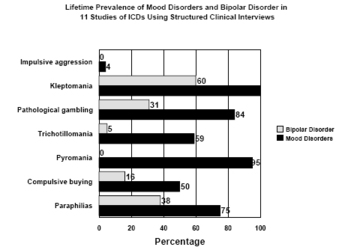Pathological gambling is classified by the DSM-IV as an impulse-control disorder (ICD). Diagnosticians broadly define ICDs as mental disorders characterized by harmful behaviors performed in response to irresistible impulses. A recent investigation hypothesized that ICDs may be closely related to bipolar disorders. Periods of mania or hypomania, usually alternating or occurring with periods of depression, characterize bipolar disorders. These two types of disorders share similarities in comorbidity, phenomenology, course, family history, biology, and treatment response. Similarities in comorbidity were examined by a recent review of 11 (uncontrolled) studies of ICDs. This review revealed that these conditions evidence comorbidity with one another. For example, a lifetime history of mood disorders (disorders that have a disturbance in mood as the predominant feature) was found in 84% of 99 pathological gamblers in 3 studies. More specifically, thirty-one percent of the patients in the 3 studies met criteria for bipolar, manic, hypomanic disorder or cyclothymia. In addition, ICDs and bipolar disorders reveal similar comorbidity patterns with other psychiatric disorders, such as substance abuse. McElroy et al. state that the relationship between ICDs and bipolar disorders has important theoretical and clinical implications. This relationship will help inform both researchers and clinicians about the nature of interconnections among impulsivity, compulsivity, and mood. Understanding these patterns may assist clinicians to develop better informed and more effective treatment programs.
Source: Adapted from McElroy, S.L., Pope, H.G., Keck, P.E., Hudson, J.I., Phillips, K.A., & Strakowski,
S.M. (1996). Are impulse-control disorders related to bipolar disorder? Comprehensive Psychiatry, 37, 229-240.
This public education project is funded, in part, by The Andrews Foundation and the Massachusetts Department of Public Health.
This fax may be copied without permission. Please cite The WAGER as the source.
For more information contact the Massachusetts Council on Compulsive Gambling,
190 High Street, Suite 6, Boston, MA 02110.





